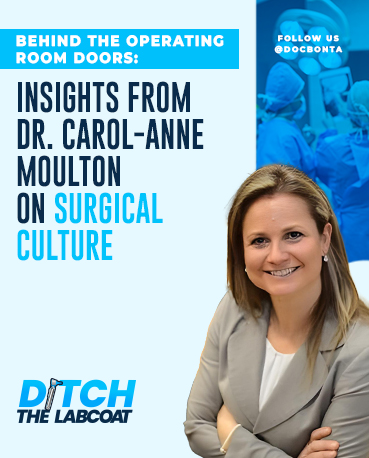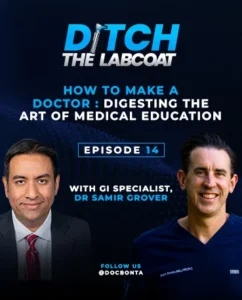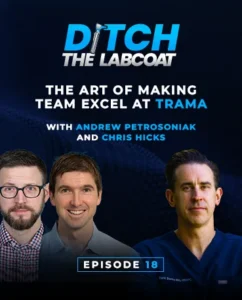The operating room has long been shrouded in mystique, often depicted as a high-stakes battleground where surgeons, armed with steely precision and unflinching confidence, reign supreme. Yet, what happens behind those closed doors is far more nuanced, as revealed in my recent conversation with Dr. Carol-Anne Moulton. A globally recognized expert on operating room culture, Dr. Moulton dissected the evolution of surgical behavior, the hidden curriculum shaping surgeons, and the profound human elements at play in these critical spaces.
https://moultonlab.uhnresearch.ca/aboutmoulton/
Surgical Culture: The Myth and the Modern Reality
Historically, the archetype of the brash, authoritarian surgeon—sometimes excused as an “a**-hole but a good surgeon”—was not only accepted but admired. This stereotype, fueled by media and entrenched norms, framed the OR as a stage for solitary genius under crushing pressure. But as Dr. Moulton highlighted, the OR culture is no longer synonymous with unchecked egos and temperamental outbursts.
“We’ve come a long way,” she noted, “but there’s still subtleties to poor behavior that persist.” While instances of throwing instruments or intentionally sabotaging colleagues’ confidence are nearly extinct, a culture of incivility and subtle intimidation can still undermine the collaborative spirit critical to patient safety.
The Evolution: Why Change Is Happening
Change in the OR reflects broader societal shifts. Dr. Moulton emphasized that surgical culture doesn’t exist in isolation—it’s a microcosm of the larger world. Increasingly, surgeons are held accountable for their behavior by institutional frameworks, such as mandatory training on workplace civility and zero-tolerance policies for harassment.
But systemic interventions alone aren’t enough. Dr. Moulton noted that the influx of more diverse voices, particularly women, has also helped reshape the field. “The feminization of surgery,” she observed, “has led to a questioning of why we can’t value both technical excellence and bedside manner.”
Stress and Performance: What We Can Learn from Elite Performers
Surgery, like elite sports or high-stakes military operations, demands extraordinary focus and composure. Dr. Moulton shared insights gleaned from surgeons who were once Olympic athletes, virtuoso musicians, or Navy SEALs. These individuals excelled not merely because of their technical expertise but due to their mastery of mental preparation, adaptability, and resilience under pressure.
“They understand how to manage their boundaries,” Dr. Moulton explained. “They push themselves to expand their comfort zones, but always within a safe margin for their patients.”
The take-home message? Mental rehearsal, compartmentalization, and a commitment to growth are not innate—they’re skills surgeons (and anyone) can learn and hone.
The Hidden Curriculum: Becoming a Surgeon vs. Staying Human
One of the most poignant revelations from our conversation was the tension between surgical training and maintaining one’s humanity. The hidden curriculum—the implicit lessons learned through observation—often teaches surgeons to suppress vulnerability and emotion as a means of coping with the immense stakes of their work. Yet, this armor can isolate them, both from their teams and their patients.
“Some surgeons have told me they wish they could reconnect with the person they were before training,” Dr. Moulton shared. “It’s a struggle to stay human in a profession that demands so much.”
She advocates for making this struggle visible, fostering a culture where vulnerability is seen as a strength. This includes honest conversations about complications and errors, which, when handled with maturity and authenticity, can deepen trust rather than erode it.
The Future Surgeon: A New Definition of Expertise
When asked to identify the qualities of an outstanding surgeon, Dr. Moulton didn’t start with technical skill. Instead, she highlighted:
- A Desire for Feedback: Surgeons who actively seek and apply feedback improve more rapidly and create a safer environment.
- Collaboration: The ability to work as part of a cohesive team, valuing every member’s contribution.
- Maturity and Authenticity: A grounded, compassionate approach that prioritizes the humanity of both patient and team.
Technical skill, she emphasized, is foundational but teachable. What distinguishes the best surgeons is their ability to lead with respect and humility, ensuring that the OR becomes a space of safety and trust.
https://www.youtube.com/watch?v=vlGQAOHaSCc
Why This Matters Beyond the OR
Dr. Moulton’s work challenges us to think about expertise and humanity not as opposites but as complementary forces. Whether you’re a surgeon, a teacher, or a parent, the lessons are universal: mastery is about more than technical precision—it’s about connection, courage, and the willingness to be vulnerable.
As I walked away from our conversation, I couldn’t help but think of the quiet power of surgeons like Dr. Moulton, who are redefining what it means to save lives—not just by cutting with skill but by leading with grace. For those of us outside the OR, the lesson is clear: to be truly excellent, we must strive not only to do better but to be better.



